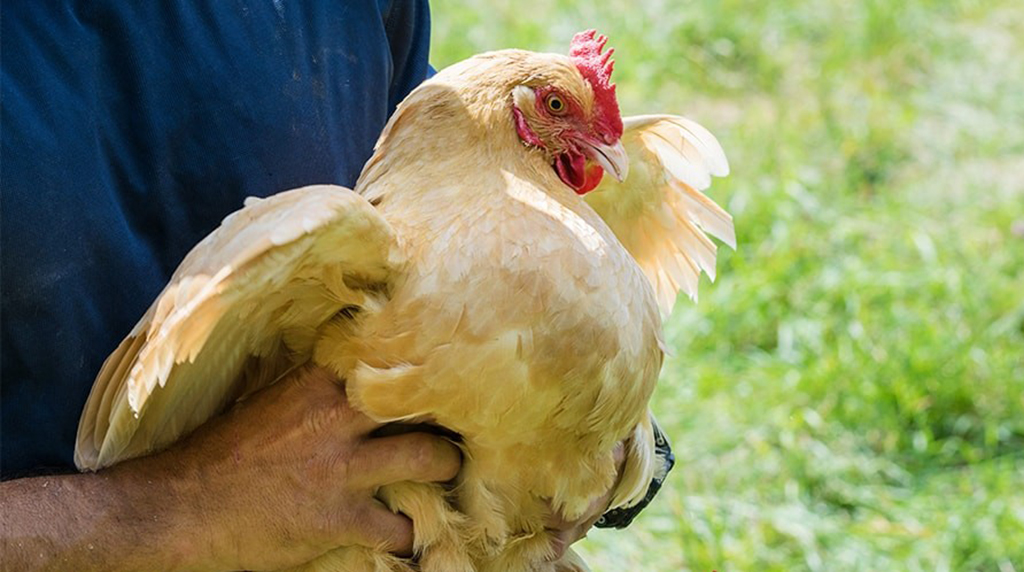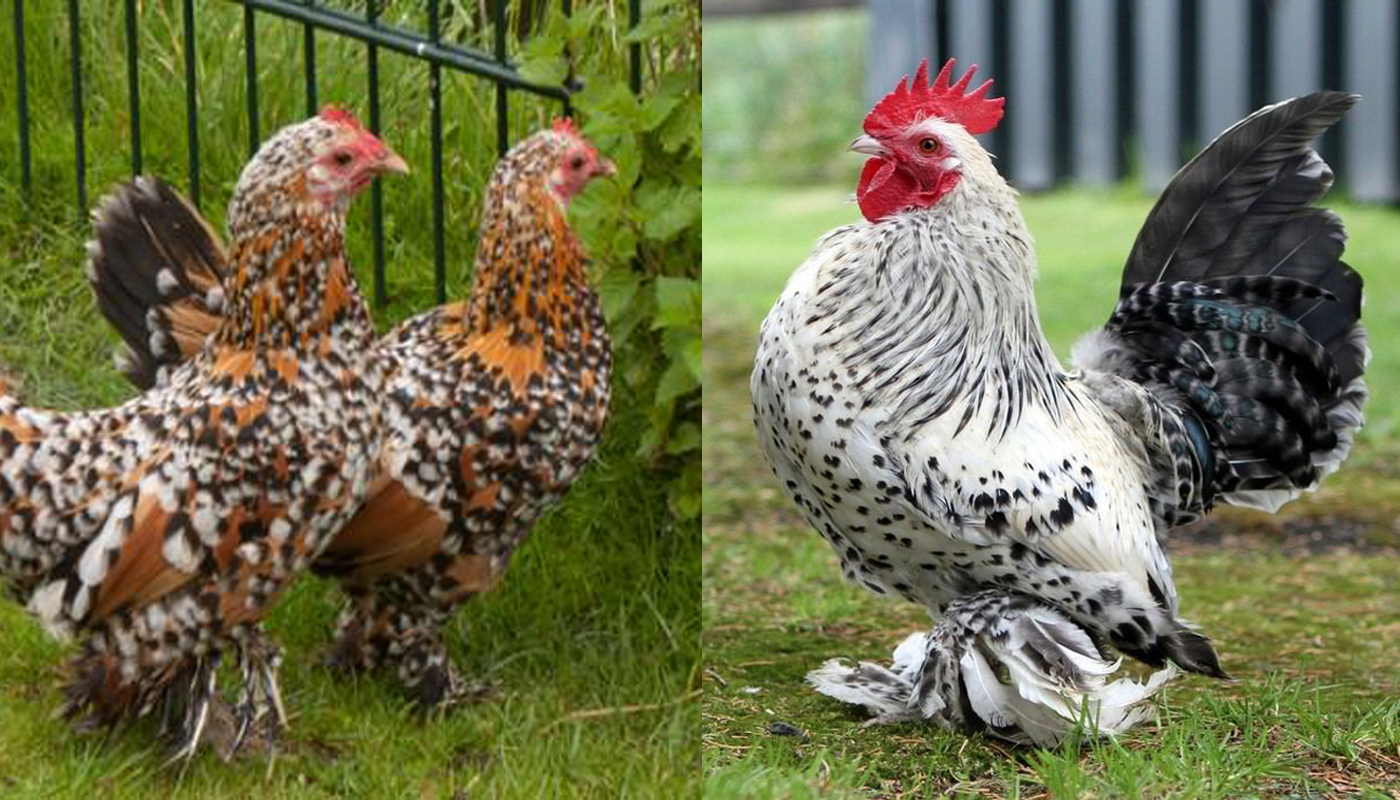
The Plymouth Rock is a very popular American breed of chicken and makes for a good all-rounder. It is a prolific egg layer, great table bird, adaptable and is a wonderful pet.
These calm beautiful birds tend to get along well with all creatures and have even been known to become besties with the dog.
They are great for supervised kids as they love cuddles and attention from their humans. Plymouths are one of the most mothering chicken breeds there is and you may even find them trying mother you!
CHARACTERISTICS |
|
|---|---|
| Country of Origin: | America |
| American Poultry Association: | Recognized as a breed of chicken in the United States |
| Chicken Category: | Large Breed |
| Chicken Class: | United States of American |
| Bantam Variety Available? | Yes – Single Comb Clean Legged Bantam Classification |
| Related | TOP 10 BANTAM CHICKEN BREEDS FOR BEGINNERS |
IDENTIFICATION⇒ |
Appearance: They are a plump bird with long clean yellow legs.
The hens coloring tends to be darker than the males. Their feathers are soft and barred. They tend to have very red earlobes, wattles, combs and faces.
Color(s): Hens have black and white barred pattern feathers
Roosters have black and white barred pattern feathers that a bit lighter of color than the hens.
Comb:They have a single comb
Ave. Weight: Hens/Pullet 6 lbs.
Cockerel 8 lbs. |
| Life Expectancy: | The average lifespan is 6 – 8 years but has been known to live for as long as 12 years. |
| Good Starter Chicken? | They are a low maintenance chicken with a nature that makes them perfect as a starter chicken. |
| Related | 10 BEST STARTER CHICKENS FOR THE FIRST TIME POULTRY KEEPER |
PURPOSE⇒ |
Eggs: They are very good egg layers.
They lay large brown eggs up to 280 per year They are steady layers, laying consistently all year around even in the winter. They start to lay eggs from around 16 to 20 weeks old.
Meat: Plymouth Rocks plumpness and yellow meat make them an excellent roast chicken breed.
Breeding: They can be bred and they hens do get broody they are also excellent mothers.
If you are breeding the Plymouth Rock for show choosing the correct hens and rooster bloodline is crucial. They make the most beautiful baby chicks that will have cream patches on their body and heads. They will also have black or dark grey coloring on them. For advice on breeding please check our guide to breed poultry. If you are a first-time breeder it is best to get professional advice from your local animal shelters, poultry farmers or vet.
Foraging: They love to scratch and forage about. They are a bird that will love to garden with you.
Show Bird: Plymouth Rocks are a popular show bird
Pets: They make wonderful pets
Other: They love to garden with their humans, scratch
Scratch out weeds and get rid of pesky pests that your garden can do without. They will give your organic garden a lot of nutritious fertilizer to ensure great blooms and tasty vegetables. |
| Health: | The good news about these beautiful birds is that they do not have any known health issues. Other than maybe mites, etc. It is always best to check them during winter months for frostbite or overheating in the summer due to their rather full plumage. |
| You may Also Like: | HOW TO TELL IS A CHICKEN IS SICK |
| Temperament: | These birds are a very popular backyard chicken due to their sweet docile temperament. They are also renown for being lovable and mothering. |
| Flyers? | They are not very good flyers at all and mostly do not even attempt to do so. |
| Noisy Birds? | They love to chatter and can get quite loud |
| Interaction with other chickens: | They get along well with other chickens but do tend to get bullied by other breeds. It is best to watch this if you have a mixed breed flock. As with any flock if you are introducing new birds it is best to slowly socialize them with the flock. |
| Good with kids? | One of the best breeds to have around children even the roosters have a gentle disposition. They do not mind being picked up or petted in fact they are quite happy in their human’s arms. |
| Related | 10 ROOSTER BREEDS THAT DO NOT MIND CHILDREN |
| Socialize Behavior? | They get along well with all other animals and it is quite common for these birds to become besties with a cat or dog. |
| You may Also Like: | HOW TO SOCIALIZING YOUR NEW CHICKENS |
| Known predators: | Most domestic animals leave them alone as they are not small birds, but it is always best to keep an eye on dogs and cats. If hawks and or foxes are in your area it is always best to take precautions. Check with local animal shelters, zoos, vets, animal control and or pet stores about common predators in your area. |
| Conservation Status: | These birds conservation status is recorded as “recovering”. It is best to check on any special license or instructions that may be set up for owning these birds. This can be checked with your local or national conservation centers. |
IDEAL ENVIRONMENT⇒ |
Garden Size: These great birds adapt well to any garden size and do well in confinement. However, as with any animal they love to roam free and free-range.
Ideal Climate: They do not mind the cold and whether the wintery months well. They are a very hardy bird and adapt to any weather or climate.
Ideal Coop: The rule of thumb for any coop is 50 cm x 50 cm per hen/rooster in the coop.
Ensure there is a good space for the nesting boxes and nightly roosting rails at least 1.5 inches wide. Good ventilation for air but not too drafty especially in winter. It is always a good idea to raise the coop off the ground to give the birds a dry place to roost and lay especially in wet weather.
Ideal Coop Run: Although it is a good idea for safety from predators to completely cover the coop run with Plymouth Rocks it is not necessary to cover the top as they do not fly.
Ideal Flock Size: They like to socialize so there should be more than one although they tend to make friends with all the animals in the garden and see them as part of their flock.
Special Instructions: They have not special grooming requirements and as they do not have many health issues are basically a low maintenance bird.
Accessories: The following accessories are ideal for your coop:
Nesting boxes Straw for the boxes and roosting area Roosting rails Perches Water troughs/bowls Food bowls/feeders Heating lamp(s) Animal carrier for transport purposes |
| You may Also Like: | 45 FREE DIY CHICKEN COOP PLANS, TUTORIALS AND DESIGNS |
WHERE TO BUY THEM |
|
|---|---|
| Live Poultry Outlets: | They can still be found at most live poultry outlets and farms, but it is best to check with your local conservation centers, reputed poultry dealers as they are a registered breed. If you plan on breeding your chickens, you will want to make sure that they are from a good bloodline. |
| Internet Poultry Websites: | There are a few internet sites such as Purely Poultry that sell the Plymouth Rock |
| Organizations: | American Poultry Association will have some extra advice on registered breeders that may be in or around your area in the USA. American Livestock Conservancy does keep some registered breeders for various breeds. |
| Breeders Clubs: | The Plymouth Rock Fanciers club has a comprehensive breeders directory and a lot of useful information about the breed. |
| Other: | The organizations and or breeders listed above may also have a host of valuable information about your chickens. They will also be able to provide you with any special instructions, problems, etc. about your chickens. |
HISTORY
The Plymouth Rock was added to the American Poultry Association standard of excellence in 1874 but was first seen in America in 1849. After being shown in Boston that year it was not seen again until the late 1880’s in Worcester, Massachusetts. In 1869 D.A. Upham cross-bred a single comb barred plumage cock with some Black Java hens. His birds were selected for their barred plumage and clean featherless legs.
These Plymouth Rock birds are thought to be the basis of the modern-day Plymouth Rock chicken.
Other breeds of chickens such as the Cochin, Dominique, White-faced Black Spanish and Brahma have been associated as bloodlines of this breed.
NOTES / SPECIAL INSTRUCTIONS
As they are registered as a “recovering” conservation status they may need an extra license to own or keep in your garden. For advice on what the bird’s conservation status and orders are please check with your local conservation department.
For breeders, it is imperative that you always check your bird’s bloodlines and ensure you are buying your birds from a reputed breeder/farm. In order to sell birds of such stature, they have to be recorded and documented, always check with local animal breeding organizations for these records.
These legitimate documents are also required should you wish to show your bird(s) in various poultry shows/competition showings.
For information and advice on adopting rescued animals, you can visit or contact your local animal welfare center.
Video
USEFUL LINKS
- Caring for your Chicken
- Feeding
- Health
- Socializing your Chicken
- Breeding Chicken
- Raising Chickens A-Z
- Hatching Eggs
- What is Molting
- Animal Shelter (ASPCA)
- American Veterinary Medical Association
- American Poultry Association
- American Animal Welfare Society
- American Animal Control
- American Animal Husbandry Society
References
- https://en.wikipedia.org
- https://livestockconservancy.org
- https://www.roysfarm.com
- https://www.mypetchicken.com
- https://www.backyardchickens.com
- https://www.feathersite.com/
 Australorp Chicken Breed – Everything You Need to Know
Australorp Chicken Breed – Everything You Need to Know La Fleche Chicken Breed – Everything You Need to Know
La Fleche Chicken Breed – Everything You Need to Know Araucana Chicken Breed – Everything You Need to Know
Araucana Chicken Breed – Everything You Need to Know New Hampshire Chicken Breed – Everything You Need to Know
New Hampshire Chicken Breed – Everything You Need to Know CHICKEN DISEASES THAT EVERY CHICKEN OWNER SHOULD BE AWARE OF
CHICKEN DISEASES THAT EVERY CHICKEN OWNER SHOULD BE AWARE OF GETTING READY TO HATCH THE EGGS – HATCHING EGGS PART 3
GETTING READY TO HATCH THE EGGS – HATCHING EGGS PART 3 CONDITIONS THAT AFFECTS A CHICKENS LEGS, TOES AND CLAWS
CONDITIONS THAT AFFECTS A CHICKENS LEGS, TOES AND CLAWS Polish Chicken Breed – Everything You Need to Know
Polish Chicken Breed – Everything You Need to Know Shamo Chicken Breed – Everything You Need to Know
Shamo Chicken Breed – Everything You Need to Know Why Deworming Chickens is Important?
Why Deworming Chickens is Important? Booted Bantam Chicken Breed – Everything You Need to Know
Booted Bantam Chicken Breed – Everything You Need to Know Rosecomb Chicken Breed – Everything You Need to Know
Rosecomb Chicken Breed – Everything You Need to Know